-
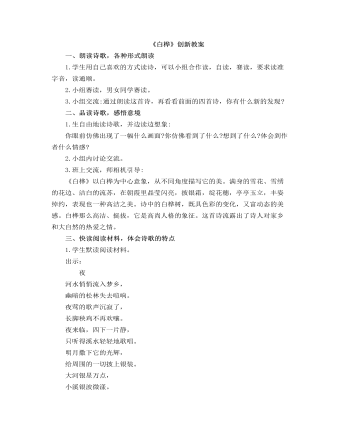
部编人教版四年级下册《白桦》创新教案
一、朗读诗歌,各种形式朗读1.学生用自己喜欢的方式读诗,可以小组合作读,自读,赛读,要求读准字音,读通顺。2.小组赛读,男女同学赛读。3.小组交流:通过朗读这首诗,再看看前面的四首诗,你有什么新的发现?二、品读诗歌,感悟意境1.生自由地读诗歌,并边读边想象:你眼前仿佛出现了一幅什么画面?你仿佛看到了什么?想到了什么?体会到作者什么情感?2.小组内讨论交流。3.班上交流,师相机引导:《白桦》以白桦为中心意象,从不同角度描写它的美。满身的雪花、雪绣的花边、洁白的流苏,在朝霞里晶莹闪亮,披银霜,绽花穗,亭亭玉立,丰姿绰约,表现也一种高洁之美。诗中的白桦树,既具色彩的变化,又富动态的美感。白桦那么高洁、挺拔,它是高尚人格的象征。这首诗流露出了诗人对家乡和大自然的热爱之情。
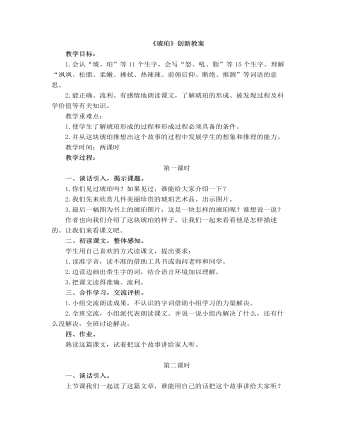
部编人教版四年级下册《琥珀》创新教案
教学重难点:1.使学生了解琥珀形成的过程和形成过程必须具备的条件。2.并从这块琥珀推想出这个故事的过程中发展学生的想象和推理的能力。教学时间:两课时教学过程:第一课时一、谈话引入,揭示课题。1.你们见过琥珀吗?如果见过,谁能给大家介绍一下?2.我们先来欣赏几件美丽珍贵的琥珀艺术品。出示图片。3.最后一幅图为书上的琥珀图片:这是一块怎样的琥珀呢?谁想说一说?作者也向我们介绍了这块琥珀的样子。让我们一起来看看他是怎样描述的。让我们来看课文吧。二、初读课文,整体感知。学生用自己喜欢的方式读课文,提出要求:1.读准字音,读不准的借助工具书或询问老师和同学。2.边读边画出带生字的词,结合语言环境加以理解。3.把课文读得准确、流利。
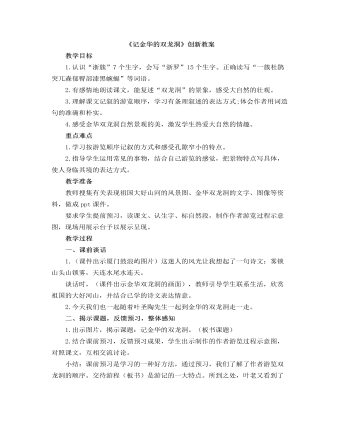
部编人教版四年级下册《记金华的双龙洞》创新教案
教学目标1.认识“浙簇”7个生字,会写“浙罗”15个生字。正确读写“一簇杜鹃突兀森郁臀部漆黑蜿蜒”等词语。2.有感情地朗读课文,能复述“双龙洞”的景象,感受大自然的壮观。3.理解课文记叙的游览顺序,学习有条理叙述的表达方式;体会作者用词造句的准确和朴实。4.感受金华双龙洞自然景观的美,激发学生热爱大自然的情趣。重点难点1.学习按游览顺序记叙的方式和感受孔隙窄小的特点。2.指导学生运用常见的事物,结合自己游览的感觉,把景物特点写具体,使人身临其境的表达方式。教学准备教师搜集有关表现祖国大好山河的风景图、金华双龙洞的文字、图像等资料,做成ppt课件。要求学生提前预习,读课文、认生字、标自然段,制作作者游览过程示意图,现场用展示台予以展示呈现。
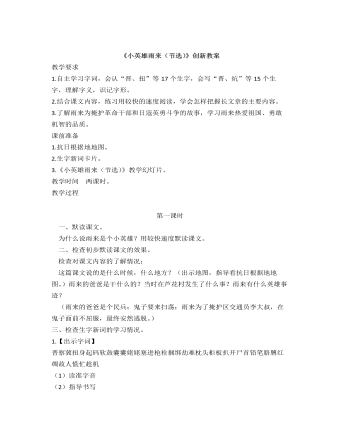
部编人教版四年级下册《小英雄雨来》创新教案
(二)提问:夜校的学习条件怎样?雨来在夜校里受到什么教育?默读第二段。指导朗读:“我们是中国人,我们爱自己的祖国。”“我们——是——中国人,我们——爱——自己的——祖国。”讨论段意和小标题。(段意:雨来上夜校,受到爱国主义教育。)(小标题:“雨来上夜校。”)(三)学习第三段。默读课文,提问:这段主要说了几层意思?学生默读课文,小组交流,展示如下:(两层意思:第一层从“有一天”至“只从街上传来一两声狗叫”,主要写鬼子开始扫荡了;第二层从“第二天”至这段结束,主要写雨来为掩护交通员李大叔,被鬼子捆绑起来了。)指导朗读第二层。重点朗读:“他抬头一看,是李大叔。”“咦!这是什么时候挖的洞呢?”“把缸搬回原地方。你就快到别的院里去,对谁也不许说。”讨论段意和小标题。段意:(雨来为掩护交通员李大叔,被鬼子捆绑起来了。)(小标题:“雨来掩护李大叔”。)
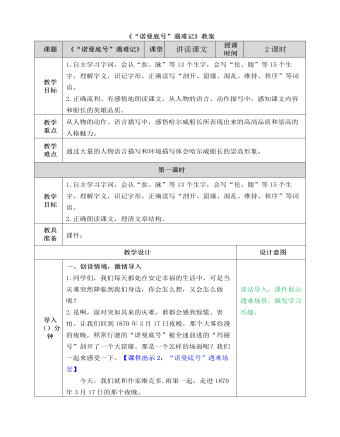
部编人教版四年级下册《 “诺曼底号”遇难记》教案
二、想象品读,体会惊恐万状的场面。1.【课件出示14】教师播放《泰坦尼克号》影片片断录音,学生倾听。2.听了刚才的场景,你感受如何?(好害怕,很恐惧等。)你们听到了什么?又仿佛看到了什么?(生自由回答)面对此情此景,你会首先想到什么呢?要实话实说。(活命、逃命、哭、什么也没想等。)3.师:那么“诺曼底号”上的人们又是怎么表现的呢?请同学们拿起笔,找出相关的段落。【课件出示15】震荡可怕极了。一刹那间,男人、女人、小孩,所有的人都奔到甲板上,人们半裸着身子,奔跑着,尖叫着,哭泣着,惊恐万状,一片混乱。海水哗哗往里灌,汹涌湍急,势不可当。轮机火炉被海浪呛得嘶嘶地直喘粗气。4.指名读文,其他评议。(1)指名学生读,从这段话中你体会到什么?(情况危急、场面混乱等),从哪些词语可以看出来?哪个词语最能体现出人们的表现?(板书:惊恐万状)(读)
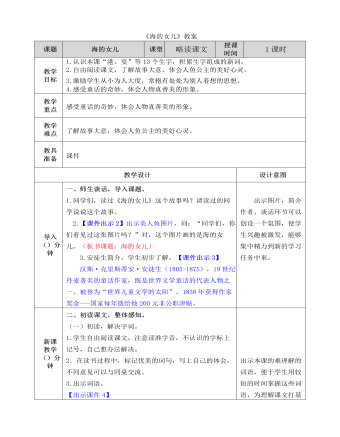
部编人教版四年级下册《海的女儿》教案
《海的女儿》介绍小人鱼亲自参加王子的婚礼,忍受身体和精神的苦痛,一步步变成泡沫,走向死亡的故事。这是一个凄美的爱情故事。成功之处:在教学过程中,以学生为主体,让学生在读通文章之后出示一些重点语句。我在教学中能够放手给学生,让他们在文本中充分品味挖掘语言的魅力内涵。让学生边读边想象,由理解句子表面的意思过渡到感悟作者蕴藏在句子中的情感,小组讨论阶段,学生在充分讨论的过程中对作者的情感就有了一定的感悟,再通过教师的点拨指导,认识上就更深一层次,对今后阅读安徒生的作品帮助很大。不足之处:由于注重了写作方法的学习,对朗读的指导就比较少,在以后的教学中要注意教学时间的合理分配。
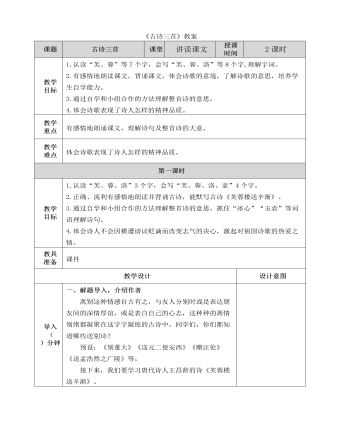
部编人教版四年级下册《古诗词三首》教案
四、品读诗文,赏析感悟1.品读前两句诗(1)请大家默读前两句,看看都写到了哪几种景物?(雨:什么时候下起了什么样的雨?江:江面上是一番怎样的景象?山:在作者眼里楚山什么样?诗中还暗含着两个人物)【课件出示9】(2)“连”“入”两个动词写“寒雨”表现一种怎样的气氛?(“连”“入”两个动词写“寒雨”的绵绵不断和无声无息,渲染出离别时的暗淡气氛。)“楚山孤”表达作者怎样的情感?(表达诗人离开朋友时的强烈的凄冷孤寂感。)【课件出示10】(板书:凄冷、孤寂感)(3)前两句有一对表示时间的词语:“夜和平明”,王昌龄一共写了两首,这首是天亮时在芙蓉楼送别辛渐时所作,另外一首描绘的是前一天夜里两人在芙蓉楼里饮酒话别时的情景。【课件出示11】(出示第一首诗)师:窗外秋雨绵绵,芙蓉楼内二人相对而坐,饮酒道别,这此情此景,给你一种什么感觉?(凄凉,忧愁)。这种情感凝聚在诗中的哪个字中?(孤)带着这种感觉,再读前两句。师:王昌龄才华横溢,官至县蔚,后来因事被贬谪岭南,在北返长安时在江宁县任职,在江宁数年,又遭人诋毁,再次被贬为龙标县蔚,龙标镇非常偏僻,曾有许多的官员被贬于此地。他一生壮志未酬,与好友分别,心中怎能不孤单、苦闷呢?
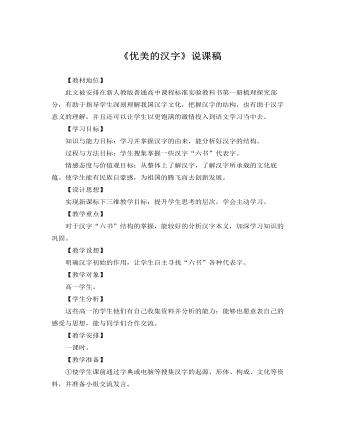
人教版高中语文必修1《优美的汉字》说课稿
明确:(1)结绳记事说。原始记事的一种方法。人类在没有发明文字或文字使用尚不普遍时,常用在绳索或类似物件上打结的方法记录数字,表达某种意思,用以传达信息,处理事件。 (2)书画说。(3)仓颉造字说。中国自古就有仓颉造字之说。文字的发明是人类发展史上一件石破天惊的大事,它将人们的思维、语言、经验以及复杂的社会现象记录下来,使文化得以传播交流、世代传承。2、汉字的形体:中华民族五千年的历史中,汉字的演变,从甲骨文--金文--大篆--小篆--隶书--草书--楷书--行书,字形由象形到点横竖撇捺的方块字,经历了漫长的岁月。其中凝聚着民族的智慧,也体现出汉字逐步完善的过程,凸显其方方正正、四平八稳的特点。汉字又是一种文化的体现,那些经过艺术处理的汉字或跳起了拉丁舞、有的如同酒醉的成龙打起了醉拳,更是让我们感到的是在欣赏汉字在纸张上跳舞,所以:书法是“纸上的舞蹈”。请大家看到书上的相关内容,注意每一种形体的汉字的载体是什么,其功能又有什么不一样。
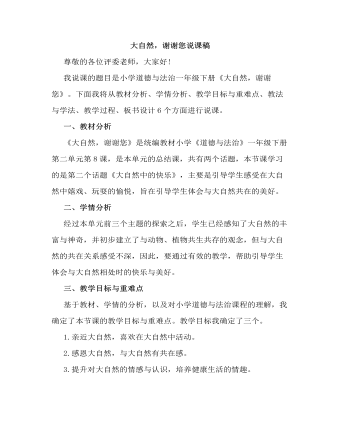
人教部编版道德与法制一年级下册大自然谢谢你
接着,教师引导学生与大自然对话,说一说:“大自然,我想对你说……”。设计意图:提升学生对大自然的情感与认识,感恩自然,喜欢在大自然中活动。活动三:阅读绘本,感恩自然学生阅读教材第30页到33页的绘本《大自然的语言》,教师引导学生说一说,大自然不仅给我们物质的馈赠、精神的馈赠,还给我们带来智慧的启迪。(板书:感恩)设计意图:再次感受与大自然的共在的情感。环节三:课堂小结,内化提升学生谈一谈学习本节课的收获,教师相机引导。设计意图:梳理总结,体验收获与成功的喜悦,内化提升学生的认识与情感。环节四:回归生活,拓展延伸课后,请同学们走进自然,拥抱自然。设计意图:将课堂所学延伸到学生的日常生活中,有利于落实行为实践。

新人教版高中英语必修2Unit 1 Cultural Heritage-Discovering Useful Structure教案二
This theme of the part is “ Describe people or things in greater detail”. Students have learned the grammar(restrictive relative clauses) in Book 1, and further review and consolidate its structure “prep+relative pronouns(which/whom)” and the relative adverbs(when, where and why), besides students should understand its form, meaning and functions. In this section, students should be able to express the grammar correctly in daily communication and in the writing. 1. Review the basic usages of relative pronouns and adverbs of attributive clauses . 2. Learn to use some special cases about restrictive relative clauses.3. Learn to write sentences with restrictive relative clauses flexibly according to the context.1. Review the basic usages of relative pronouns and adverbs of attributive clauses .2. Learn to use some special cases about restrictive relative clauses.3. Learn tow rite sentences with restrictive relative clauses flexibly according to the context.Step 1. Observe the following sentences, and mark the relative pronouns and the adverbs. 1. After listening to the scientists who had studied the problems, and citizens who lived near the dam, the government turned to the United Nations for help.2. Temples and other cultural sites were taken down piece by piece, and then moved and put back together again in a place where they were safe from the water.Step 2 PracticePlease complete these sentences with relative pronouns and relative adverbs and answer the following questions.Questions: 1. What is the head noun ?2. What relative words should be used ?3. What elements do they act in these sentences ?

新人教版高中英语必修2Unit 2 Wildlife Protection-Reading for Writing教案二
This lesson aims at making a poster about protecting wildlife after reading some posters. During reading students are guided to understand the content and try to summarize the posters with one sentence. Then students are guided to try to make a poster about protecting wildlife.1. Read the two posters and try to understand the summary sentences.2. Look at the two posters and try to understand what emotions they express.3. Try to summarize the features of posters4. Try to make a poster about wildlife.1. Look at the two posters and try to understand what emotions they express.2. Try to summarize the features of posters3. Try to make a poster about wildlife.Step 1 Lead inLook at the the posters on the textbook and ask:Which emotions do the posters communicate ?Step 2 Read the poster and answer the questions.1. What do you think of the animals in the poster on the left ?I think it is frightening and ugly.2. Why do we should protect the ugly animals ?All species--the good, the bad, and the ugly-- should be treated equally.The world needs all kinds--without variety, our planet cannot survive.3. Why are billions of trees being cut down every year ?To make paper for humans.4. What result will be lead to after the trees are cut down ?A lost of animal homes are being destroyed./The habitat of wildlife is being destroyed.Step 3 Find the feature of posters1. What does each poster use to stir up emotions ?On the left, it makes us a little frightened and it looks a little ugly, but it can activate our curiosity--What is it? And What is wrong with it?On the right, it makes us feel a little sad and want to protect them.

新人教版高中英语必修2Unit 1 Cultural Heritage-Reading and Thinking教案二
1. This section focuses on "Understanding how a problem was solved”, which is aimed to guide students to analyze and discuss the challenges and problems faced by cultural heritage protection during the construction of Aswan Dam, as well as the solutions. On the basis of understanding, students should pay attention to the key role of international cooperation in solving problems, and attach importance to the balance and coordination between cultural heritage protection and social and economic development. Students are encouraged to face challenges actively, be good at cooperation, and make continuous efforts to find reasonable ways and means to solve problems.2. Enable students to understand the main information and text structure of the reading text;3. Motivate students to use the reading strategy "make a timeline" according to the appropriate text genre;4. Enable students to understand how a problem was solved;5. Enable students to understand the value of protecting cultural heritage by teamwork and global community;1. Guide students to pay attention to reading strategies, such as prediction, self-questioning and scanning.2. Help students sort out the topic language about protecting cultural relics and understand the narrative characteristics of "time-event" in illustrative style3. Lead students to understand the value of protecting cultural heritage by teamwork and global community;

新人教版高中英语必修2Unit 2 Wildlife Protection-Discovering Useful Structure教案二
2.表示现阶段正在进行的被动动作(该动作在说话的瞬间未必正在进行)。Many interesting experiments are being carried out these days.(说话时,并不一定正在进行)3.表示一种经常性的被动行为,常和always,constantly 等表示频度的副词连用,这种用法常常带有赞扬或厌恶的感情色彩。He is always being praised by the leader.4.表示按计划或安排主语将要承受谓语动词所表示的动作(仅限于少数及物动词)。A party is being held tonight.Step 4 Special cases1.像take care of, look after, talk about, think of等动词与介词构成的短语用于现在进行时的被动语态时, 其中的介词不可省略。The ways to stop illegally hunting are being talked about. 2.可与部分情态动词连用,表示对正在发生的事情的推测。She may be being punished by her mother.3.有时可表示按计划或安排将要进行的一个被动动作。A celebration is being held this weekend for his success.4.某些表示“状态、心理活动、存在”等的动词,如have,want,need,love,一般不用现在进行时的被动语态,而常用一般现在时的被动语态。With the population increasing,more land is needed.5.“be+under/in+n.”可表示现在进行时的被动意义。My computer is under repair.=My computer is being repaired.

新人教版高中英语必修2Unit 2 Wildlife Protection-Reading and Thinking教案二
The theme of this unit is human and nature, focusing on the theme of wildlife protection. Nature is a complex ecosystem, in which there are delicate balance between animals and plants. Because of the role of the food chain, the extinction of one species will produce influence, causing a series of chain reaction. Large scale extinction of species will have a serious and even irreversible impact on the ecosystem, resulting in immeasurable losses. Therefore, it is of great significance to protect wild species. To protect wild species is to protect human beings themselves. The motto of this unit is "when the buying stops, the killing can too,” which is a public service advertising slogan to protect wildlife. It tells people that every rhinoceros horn, every fur, every bowl of shark fin soup, every Ivory product, and every tiger bone product, etc. consumed by human beings, are innocent wild animals slaughtered behind them. The mission of wild aid is to ban illegal trade in endangered wildlife and mitigate climate change. It aims to educate the public to reduce the consumption demand for endangered wildlife products through public publicity and improve the awareness of environmental protection.1. Improve the awareness of wildlife protection by acquiring the knowledge of wildlife protection.2. Focus on environmental protection and protection of all lives.3. Analysis of the living environment of wild animals with appropriate thinking mode.4. Skillfully use the vocabulary and grammar knowledge of this unit to cultivate self-study ability according to the unit content5. Develop cooperative learning ability through discussion and other ways1. Enable the Ss to talk about the current situation of wild animals.2. Guide the Ss to summarize the main idea of each paragraph as well as the main idea of the text.

新人教版高中英语必修2Unit 3 The Internet-Discovering Useful Structure教案二
This teaching period mainly deals with grammar “The Present Perfect Passive Voice.” To begin with, teachers should lead students to revise what they have learned about the Present Perfect Passive Voice. And then, teachers move on to stress more special cases concerning this grammar。This period carries considerable significance to the cultivation of students’ writing competence and lays a solid foundation for the basic appreciation of language beauty. The teacher is expected to enable students to master this period thoroughly and consolidate the knowledge by doing some exercises. 1. Guide students to review the basic usages of the Present Perfect Passive Voice2. Lead students to learn to use some special cases concerning the Present Perfect Passive Voice flexibly.2. Enable students to use the basic phrases structures flexibly.3. Strengthen students’ great interest in grammar learning.1. Help students to appreciate the function of the Present Perfect Passive Voice in a sentence2. Instruct students to write essays using the proper the Present Perfect Passive Voice.观察下列句子特点,总结共同点。1.(教材P28)Much has been written about the wonders of the World Wide Web.2.(教材P28)But the Internet has done much more for people than simply make life more convenient.3.(教材P28)Many people have been helped by the club.4.(教材P28)She no longer feels lonely, and her company has become quite successful.5.(教材P32)Today I thought I’d blog about a question that has been asked many times—how do you stay safe online and avoid bad experiences on the Internet?

新人教版高中英语必修2Unit 3 The Internet-Listening &Speaking&Talking教案二
From the pictures in the text and the title--- choose the best app, we can know that this part is about how to save money by using apps.Step 2 While-listening1. Laura and Xiao Bo are talking about apps. Listen to their conversation and find out what apps they want.Xiao Bo is looking for a(n) exercise app to help him get in shape.Laura would like an app for getting rich and another that will make her grades better.2. Listen again. Are the sentences true T or false F?1). Both of Xiao Bo's apps keep track of the steps he takes._____2). Xiao Bo's second app can help him make a fitness plan._____3). Laura needs an app that will help her get discounts.______4). Laura needs an app that will add money to her bank account._______F T F T3. Listen once more and tick the sentence you hear. Underline the words used to express predictions, guesses, and beliefs.Predictions, Guesses, and Beliefs________It might help me walk more.________My guess is that it wouldn't work.________I imagine this app would help me get fit faster________I suppose that would be good.________I guess you could save a little with this app.________I suppose there would be some problems, too.________I believe this app could help me get thinner.

新人教版高中英语必修2Unit 3 The Internet-Reading and Thinking教案二
Q5:What's Jan's next goal?Her next goal is to start a charity website to raise money for children in poor countries.Q6:What can we learn from her experiences?We learn that when we go through tough times, we can find help and support from other people online. We learn that we can feel less lonelyStep 5: While reading---rethinkingQ1: What is Jan’s attitude to the Internet ?Thankful/Grateful, because it has changed her and her life.Q2: What writing skills is used in the article ?Examples(Jan’s example, the 59-year-old man’s and the 61-year-old woman’s example)Q3: Can you get the main idea of the article ?The Internet has changed Jan’s life/Jan’s life has been changed by the Internet.Step 6 Post reading---Retell the storyMuch has been written about the wonders of the World Wide Web. There are countless articles (1)telling(tell) us how the Internet has made our lives more convenient. But the Internet has done a lot (2)more(much) for people than simply make life more convenient. People’s lives (3) have been changed(change) by online communities and social networks so far. Take Jan for example, who developed a serious illness that made her (4)stuck(stick) at home with only her computer to keep (5)her(she) company. She joined an online group (6)where she could share problems, support and advice with others. She considered the ability to remove the distance between people as one of the greatest (7)benefits(benefit). She was so inspired (8)that she started an IT club in which many people have been helped. She has started to learn more about how to use the Internet to make society better. Her next goal is to start a charity website to raise money (9)for children in poor countries. Jan’s life has been (10)greatly(great) improved by the Internet.

新人教版高中英语必修2Unit 3 The Internet-Reading for Writing教案二
8. However, the more polite you are, the less likely it is you will be attacked. 然而, 你越有礼貌, 你被攻击的可能性就越小。 Step 8 Writing---the articleHow to stay safe in the online chat roomToday I thought I’d blog about a question that has been asked many times--- how do you stay safe online and avoid bad experiences in the online chat room ? I’m not an expert, but many years as a blogger have taught me a thing or two.First of all, there’s the golden rule of the Internet: keep out of what makes you uneasy. Don’t post comments or click on anything. Second, protect your privacy. Don’t give out too much private information like your address, phone numbers, the ID numbers, etc. Third, be polite. If you are polite to others on the Internet, you won’t be attacked in normal situation. Finally, don’t believe in others easily and never meet someone you met online alone. It is very dangerous.Have you had any bad experiences online, or do you have some good advice for staying safe? Post your comments below!Step 9 Pair workExchange drafts with a partner. Use this checklist to help your partner revise his/her draft.1. Does the writer tell the reader what he/she know about the topic ?2. Are the tips and suggestions well organised ?3. Has the writer defined the new words ?4. Does the author include examples, comparison, or explanations ?5. Does the writer end by asking readers to leave comments and/or suggestions ?6. Can you find any grammar or spelling mistakes.Step 6 HomeworkPut up your revised draft in the classroom or read it to your class.

新人教版高中英语必修2Unit 4 History and Traditions-Discovering Useful Structure教案二
This teaching period mainly deals with grammar: The past participle is used as attributive and objective complement.1. Guide students to review the basic usages of the past participle used as attributive and objective complement.2. Lead students to learn to use some special cases concerning the past participle used as attributive and objective complement flexibly.3. Strengthen students’ great interest in grammar learning.1. Help students to appreciate the function of the past participle used as attributive and objective complement.2. Instruct students to write essays using the past participle used as attributive and objective complement.Step1:温故而知新。Analyze the underlined phrases and then sum up the common usages of the past participles.1.(教材P41)They had castles built(build) all around England, and made changes to the legal system.2.(教材P42)They use the same flag, known(know) as the Union Jack,...3.(教材P42)Judy and I had our car parked(park) in an underground car park near Trafalgar Square, where we could get our car battery charged(charge).Common points: f the past participle used as attributive and objective complement.Step 2:过去分词作定语时的意义1.及物动词的过去分词作定语,在语态上表示被动;在时间上,常表示动作已经发生或完成,有时也不表示时间性。Our teacher watched us doing the experiment and gave us a satisfied smile at last.我们的老师看着我们做实验,最后给了我们一个满意的微笑。The plan put forward at the meeting will be carried out soon.会上提出的计划将很快被执行。2.不及物动词的过去分词作定语,它不表示被动意义,只强调动作完成。Many little kids like gathering fallen leaves in the yard.

新人教版高中英语必修2Unit 4 History and Traditions-Reading and Thinking教案二
Step 5 While reading---Task 3Read the text again and answer the following questions.Q1: How many countries does the UK consist of ?4 Q2: What are the four countries of the United Kingdom?England, Wales, Scotland and Northern Ireland Q3: Which two were the first to be joined together ?England and WalesQ4: What are the two chief advantages of studying the history of a country ?The first one is to help you understand more about the country and its traditions.The second one is to make visiting it more enjoyable.Q5: What’s the author’s attitude towards studying the history ?Supportive/positiveStep 6 Post reading---Retell the textThe United Kingdom, Great Britain, Britain, England—many people are confused by (1)_____ these different names mean. In the 16th century, the nearby country of Wales (2) __________(join) to the Kingdom of England. In the 19 th century, the Kingdom of Ireland was added to create the United Kingdom of Great Britain and Ireland. Finally, the southern part of Ireland (3) ______ (break) away from the UK, which resulted in the full name we have today. However, most people just use the (4)_________(shorten) name: the UK. The four countries (5)__________ belong to the United Kingdom work together in some areas. There were four sets of invaders and the last group were the Normans. They had castles (6)_________(build) all around England and made changes (7)__________ the legal system. Studying the history of the country will make your visit much more (8)_________(enjoy). The capital city London is (9)___ ancient port city that has a history (10)______(date) back to Roman times. 1. what 2.was joined 3.broke 4.shortened 5.that 6. built 7.to 8.enjoyable 9.an 10.dating Step 6 Homework

